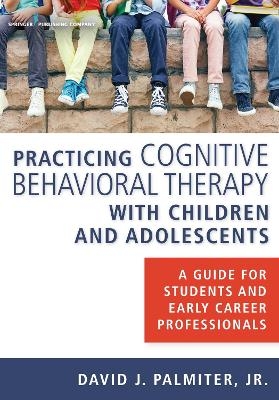
Practicing Cognitive Behavioral Therapy with Children and Adolescents
Springer Publishing Co Inc (Verlag)
978-0-8261-3118-8 (ISBN)
Even the best grounding in the science and principles of psychotherapy can leave students poorly prepared for actual face-to-face work with clients. This important resource is dedicated specifically to increasing the confidence and professional competence of graduate students and early career professionals who use cognitive behavioral therapy (CBT) with children and adolescents. With accessible language, engaging humor, and step-by-step guidance on what to do and when to do it, the author walks learners through the entire clinical process from initial consultation with young clients and their caregivers through the conclusion of treatment. With a focus on promoting joy and meaning, the book also integrates interventions from positive psychology literature with CBT techniques.
The guide is replete with procedural instructions for each step of treatment along with suggested sample language and flexible scripts that can be tailored to the needs of individual clients. Brief rationales for each procedure describe how therapeutic interactions and statements support effective and ethical practices. Evidence-based CBT techniques address issues ranging from mood disorders to anxiety disorders and other internalizing problems and include such skills as externalizing the problem, behavioral activation, physiological calming and mindfulness, and happy/coping thoughts. Strategies that engage families in the therapeutic process are included, providing guidance on how to coach parents and other caregivers to participate in certain interventions, respond well to defiance in youth, and create a supportive environment. Pointers for dealing with common types of resistance from youth and caregivers include specific steps and sample scripts. As a special feature, the use of close-up magic as a tool to facilitate an alliance, overcome resistance, and teach clinical concepts to youth is illustrated throughout the book. Chapters offer ready-to-use forms, templates, worksheets, and client handouts. An ideal resource for the needs of trainees and early career professionals, this engaging text will also interest more seasoned professionals who wish to learn how to do CBT with youth.
Key Features:
PresentsCBT-based and positive psychology techniques specifically for practicum and internship students and other early career professionals
Fosters the development of confidence and competence in practicing CBT with youth
Provides easy-to-read, step-by-step guidance including sample scripts that can be easily adapted
Offers proven strategies for engaging families in the therapeutic process
Delivers pointers for dealing with common treatment challenges
David J. Palmiter, PhD, ABPP, is Professor, Department of Psychology and Counseling, and Director, Psychological Services Center at Marywood University, Scranton, PA.
Foreword by Edward J. O'Brien
Preface
1 Introduction
Remarks for Trainees and Early Career MHPs
Conventions in This Volume
Parent-Lunatics
Positive Ethics
Multiculturalism
Section I: Establishing the Foundation
2 The Initial Evaluation
The Framework of the Evaluation
The Preinterview Work
The Office
The Initial Interview
Individual Interview With the Kid
Work in Between Sessions
Evaluating Suicidal Ideation
3 Feedback and Treatment Planning
Feedback Session
Treatment Planning
Types of Treatment Contracts
4 Techniques for Facilitating Adherence and Responding to Resistance
Facilitating Adherence
Responding to Resistance
Section II: Engaging the Youth
5 Externalizing the Problem
Explanation
Additional Commentary
Intervention Tracking Log
6 Behavioral Activation and Sleep Hygiene
The Modular Treatment Approach
Behavioral Activation
Sleep Hygiene
7 Physiological Calming and Mindfulness
Physiological Calming
Measuring Relaxation
Mindfulness Strategies
8 Coping/Happy Thoughts, Gratitude, and Crisis = Pain + Opportunity
Beginning Sessions
Coping Thoughts
Gratitude
Crisis = Pain + Opportunity
Section III: Engaging the Parent(s)
9 Parent Integration and Special Time
Timing of the Parent Session
Preparing the Kid for the Parent Session
The Parent Consultation
Funeral Exercise
Additional Parent Sessions
10 Thought Testing and the Serenity Prayer
Thought Testing
Serenity Prayer
11 Problem Solving
Problem Solving in a Family Session
Problem Solving in an Individual Session
12 Establishing and Growing Strengths and Acts of Kindness
Establishing a Foundation
Strengths Development Plan
Teaching About WAIT
Acts of Kindness
13 Defiant Kids
Setting a Context
Parent Work With Kids Age 12 and Under
Parent Work With Kids Age 13 and Older
Punishment
Section IV: Final Phase and Termination
14 Using Exposures
Engaging the Kid
Engaging the Parent
Exposure Nuances
Sessions Going Forward
Nuances With Other Populations
15 Termination and Booster Sessions
Context
Introducing Termination to a Kid
Introducing Termination to the Parents First
Introducing Termination to Parents Second
The Last Session Prior to Starting Booster Sessions
Booster Sessions
Section V: Surprising Events and Special Circumstances
16 Surprising Events With Kids
17 Surprising Events With Parents
A Pattern of Interfering Transference
18 Should You or Should You Not?
Appendices
A Intake Forms
B Family Psychiatric History Forms
C Developmental History Form
D Interpersonal Inventory
E Sentence Completion Tasks
F Individual Interview With the Youth
G Lethality Evaluation Form
H Treatment Plan Form
I Intervention Tracking Log
J Recommended Resources
Index
| Erscheinungsdatum | 10.07.2016 |
|---|---|
| Verlagsort | New York |
| Sprache | englisch |
| Maße | 178 x 254 mm |
| Themenwelt | Geisteswissenschaften ► Psychologie ► Entwicklungspsychologie |
| Medizin / Pharmazie ► Medizinische Fachgebiete ► Pädiatrie | |
| Medizin / Pharmazie ► Medizinische Fachgebiete ► Psychiatrie / Psychotherapie | |
| Medizin / Pharmazie ► Physiotherapie / Ergotherapie ► Rehabilitation | |
| Sozialwissenschaften ► Soziologie | |
| ISBN-10 | 0-8261-3118-2 / 0826131182 |
| ISBN-13 | 978-0-8261-3118-8 / 9780826131188 |
| Zustand | Neuware |
| Haben Sie eine Frage zum Produkt? |
aus dem Bereich


